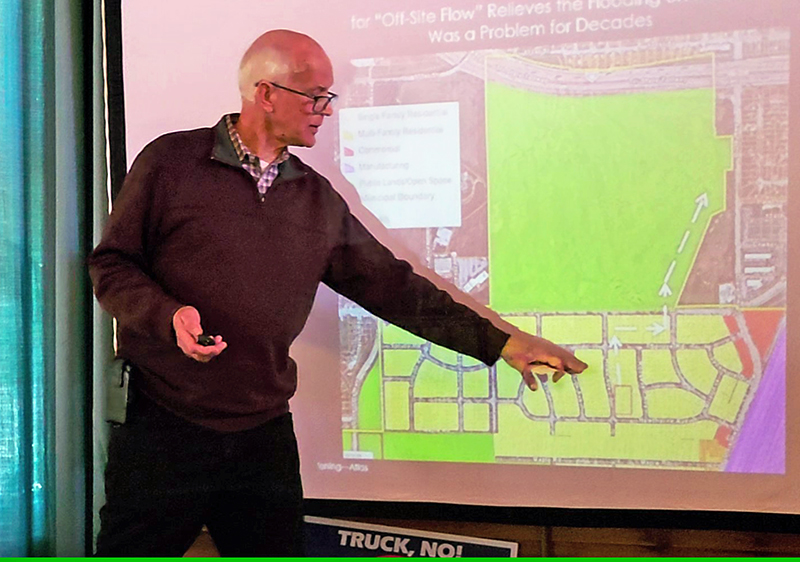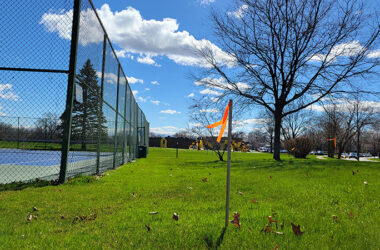Hazel Crest could add a golf course that is poised to become a commercial/industrial development to the village with one vote on Tuesday, Feb. 14.
The Board of Trustees will consider a measure at its regular meeting that would annex the portion of Calumet Country Club that was part of Homewood until 2021, a prerequisite for redevelopment of the property into a mixed commerical/industrial complex.
Opponents and proponents of the project have been ramping up public outreach prior to the vote.
South Suburbs for Greenspace, which formed in January 2021 to protest the redevelopment of the property for industrial use when it was part of Homewood, held an informational meeting Sunday, Feb. 5, at Wiley’s Grill in Flossmoor. The group is also planning a rally prior to the Hazel Crest board meeting at 6 p.m. Tuesday at village hall, 3601 183rd St.

from Homewood’s Governors Park neighborhood across Calumet Country Club.
Albrecht and other members of the South Suburbs for Greenspace worry that
if Calumet Country Club is redeveloped as mixed industrial/commercial use
it will increase flooding for residents in the area. (Eric Crump/H-F Chronicle)
SSG co-founder Liz Varmecky estimated 100 people filled the restaurant at the peak of attendance.
Catalyst Consulting, which is working with property owner Diversity Partners of Scottsdale, Arizona, has been holding weekly information sessions on Thursdays at the clubhouse. About 25 people attended the session on Feb. 2.
The firm developed a new version of the plan that was presented to Homewood officials in 2019. The earlier version was a fulfillment center that would have included nearly 700,000 square feet of warehouse space and would have been served by about 300 trucks per day.
Catalyst officials have been trying to distinguish the new plan from the previous version. It still includes warehousing. In fact, warehousing space will be bigger in the new plan, about 1 million square feet, but they said the warehouses will operate differently and have much less truck traffic than the previous plan.
The new plan surrounds the warehousing at the center of the property with a variety of commercial and industrial uses, including an aquaponics facility, a hotel, a stadium, a water park and a condominium.
Jerry Lewis, a partner in Catalyst Consulting, said the town center approach is intended to provide amenities the South Suburbs need.
“We didn’t want to build something that was about money,” he said. “We wanted to build something that’s about people.”
At the SSG meeting, Varmecky argued that the continued presence of warehousing contradicts the claim of service to the region’s people.
“I’ve heard people say this project looks good just minus the industrial warehouses and factories in the center,” she said. “Why can’t we just have the good stuff and leave out the trucks?”
She said the warehousing remains because that’s the use property owner Walt Brown of Scottsdale, Arizona, is committed to.
“It’s because an Arizona millionaire doesn’t believe the Southland is worth anything but industry,” she said, citing an email message Brown sent to Homewood’s then-Village Manager Jim Marino in 2019 that said the community’s demographics would only support industrial uses at the country club site.
A resident asked Lewis why warehousing continues to be part of the Catalyst plan. He cited two reasons: the jobs that use generates and improvements to local supply chains that can help stores keep their shelves stocked.
Another person at the Feb. 2 Catalyst meeting asked why the firm thinks the various other commercial uses will be successful when Brown argued that only industrial uses would work there.
Lewis said the town center approach, which gathers a variety of uses into one place, would help all the businesses succeed by leveraging their proximity to each other.
Lewis also addressed a concern opponents have had that the warehouses would be built first and the more attractive uses would not come to fruition. He said the aquaponics facility would be the first project and the warehouses would be the last, probably coming five or six years after the start of construction.
Varmecky noted at the Feb. 5 meeting that Hazel Crest might be opening itself up to legal trouble if it annexes the property. She cited Hazel Crest Village Attorney John Murphey, who in a July 5, 2022, memo to village officials, said the village was not subject to litigation if it declined a request for annexation, but it could face legal action if the property becomes part of the village.
She said Brown’s company, Diversified Partners, filed suit against the City of Tempe, Arizona, in 2019, and against the city’s mayor and councilmembers individually, for denying a special use permit to one of Diversified Partners’ clients. The company was also party to a lawsuit against Homewood requesting disconnection of the property from the village. That suit originally was filed by the previous owners of the country club, CCC Investors, but apparently was inherited by Diversified Partners when it bought the property.
Varmecky also pushed back against comments by some Hazel Crest officials that the opposition to the project is being fueled by outsiders. SSG members, who live mainly in Homewood, Flossmoor and Hazel Crest, have argued throughout the controversy that the developers and some local officials are using “divide and conquer” strategies, attempting to pit residents of different villages against each other.
She noted that residential neighborhoods in Homewood, Hazel Crest and East Hazel Crest are adjacent to the country club and will be affected by any development there.
“This movement is about stopping more industry and trucking from coming into the community. It’s about protecting the Southland greenspaces, air quality, health and property values for all of us in the Southland,” she said. “We are neighbors and friends. We are volunteers who live and work in the Southland.”
In addition to Varmecky, a number of SSG members spoke at the meeting, including Penny Catlett of Hazel Crest; Gary Dingle, president of NAACP Chicago Far South Suburban Branch; Jeffrey Albrecht of Homewood; Erika Shafer of Flossmoor; Michelle Yates of Homewood; and David Sacks of Flossmoor.
The speakers elaborated on traffic, air quality and flooding concerns they have with the project.


